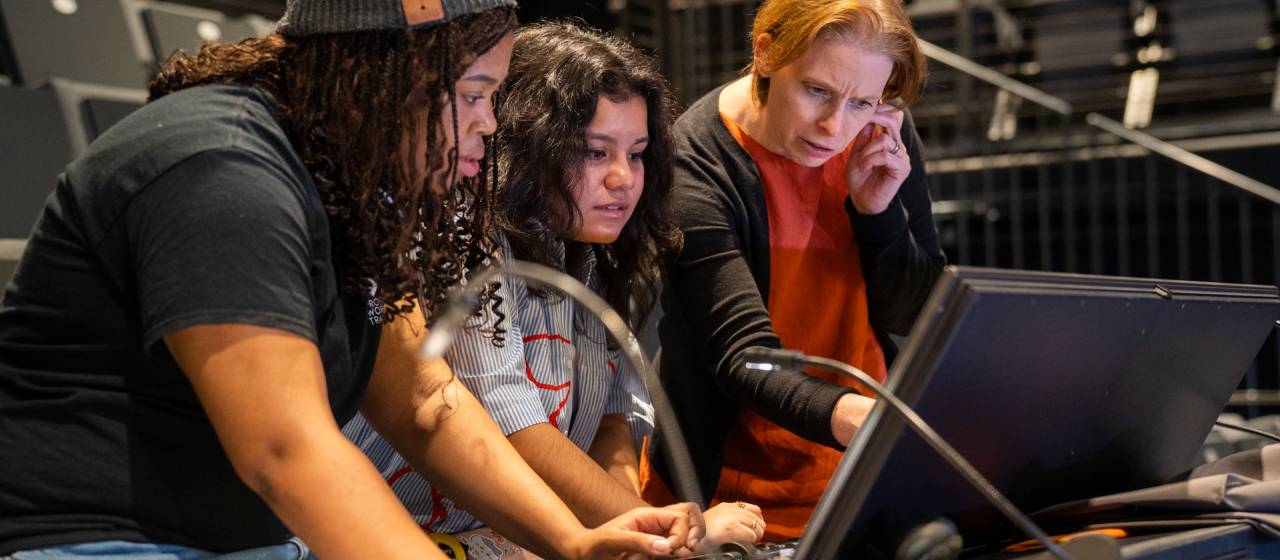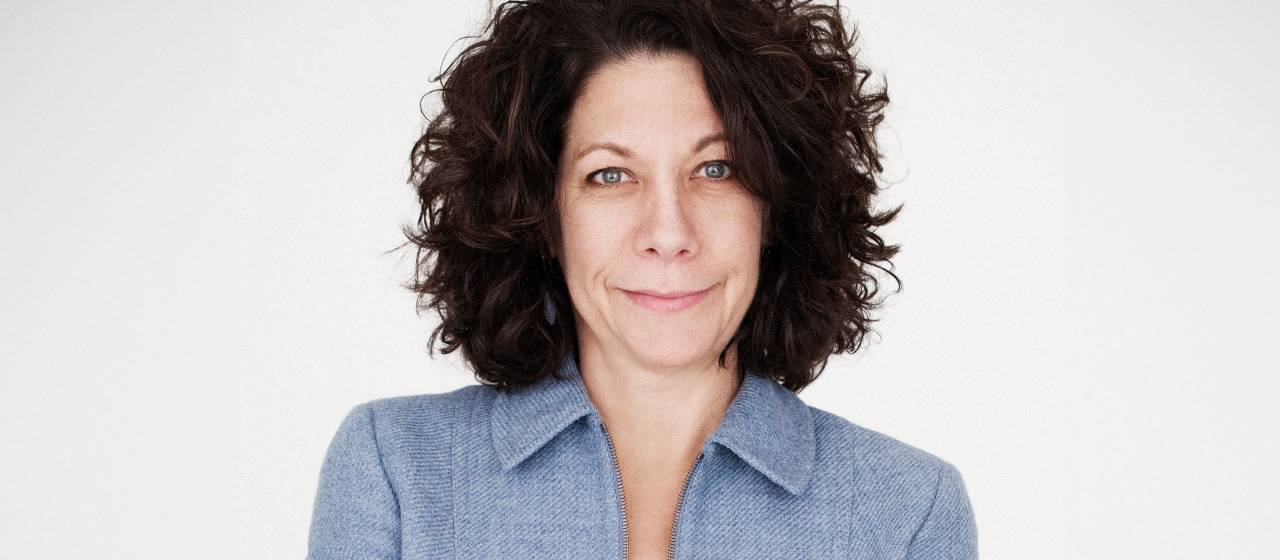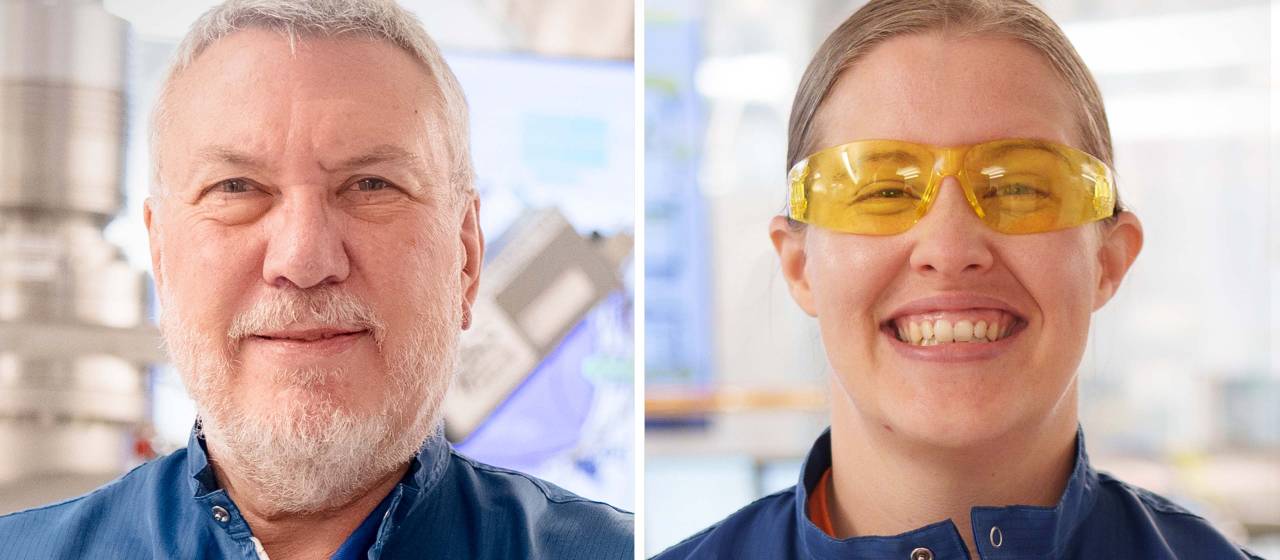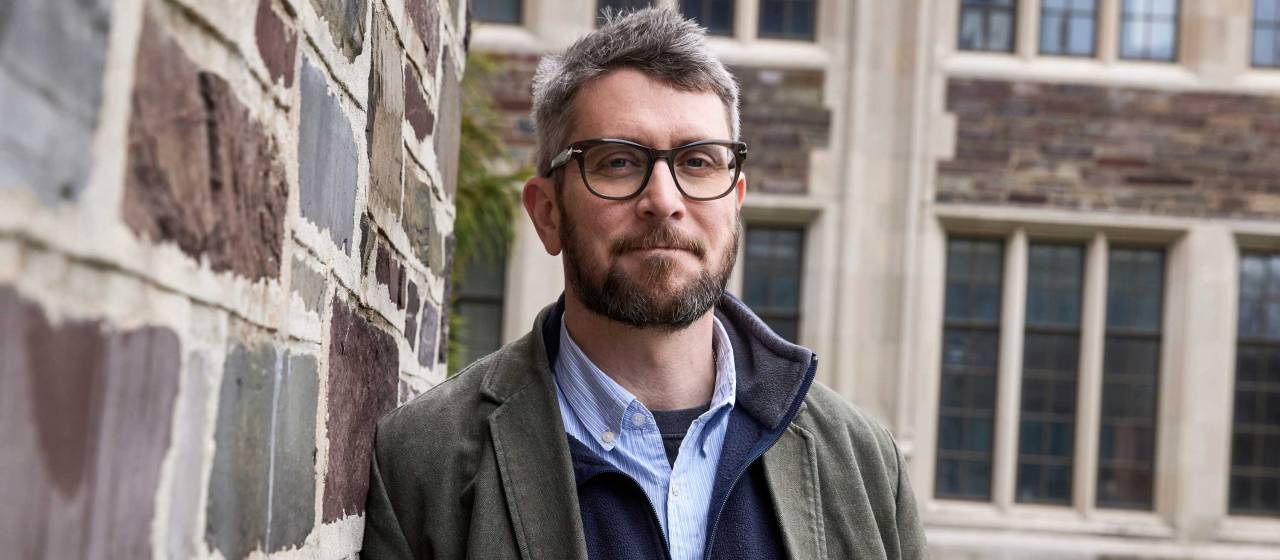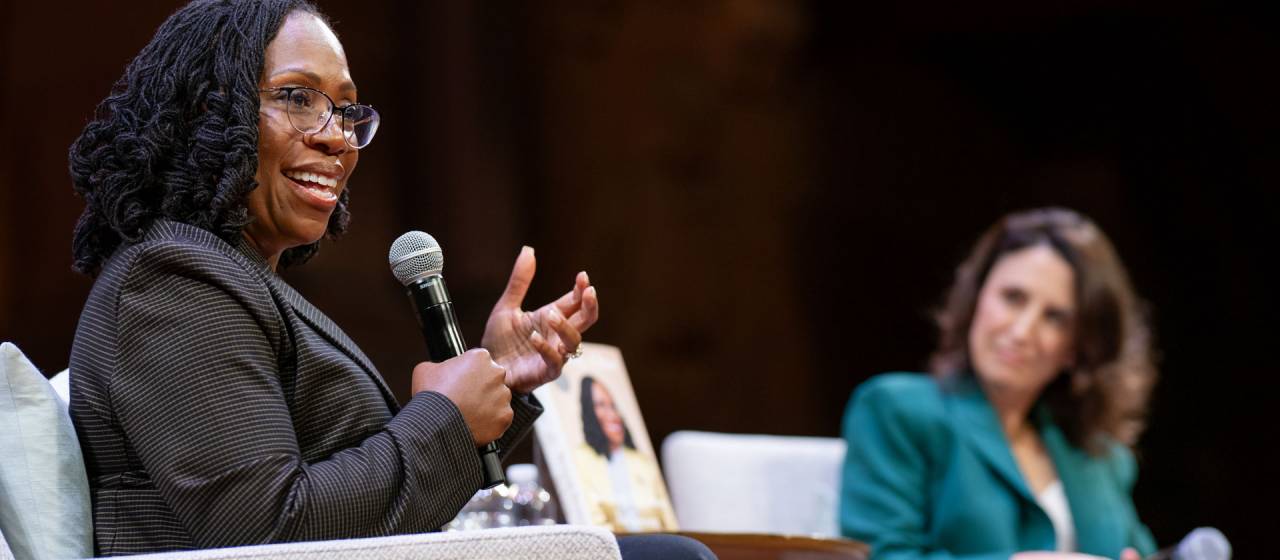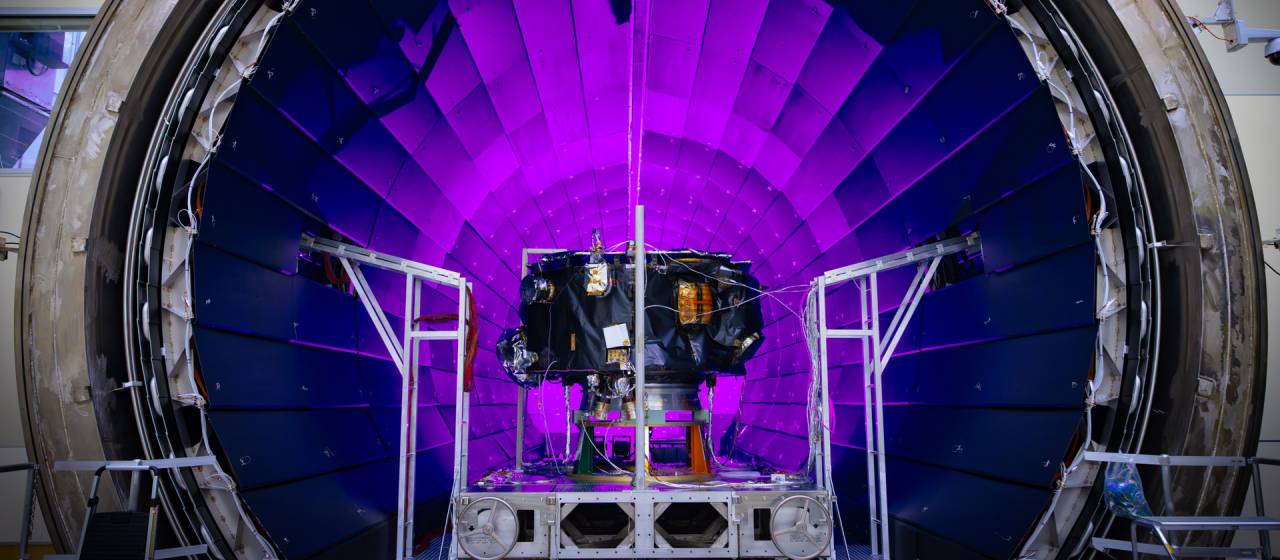Innovative tech workforce training preps N.J. high school graduates for high-paying theater stagehand jobs
Aven Rivas had a dilemma.
After wrestling to attach U-brackets onto three speakers, each about the size and weight of a 30-pound kettlebell, she looked at the catwalk 25 feet above her head at Princeton’s Wallace Theater — where the next task was to hang the speakers from a truss.
“I’m afraid of heights,” she told her work partner, Noni Burke. “But I’m going to do what Tess says — I’m going to do something every day that challenges me.”
Rivas and Burke are two of four fellows in the inaugural cohort of the Lewis Center for the Arts’ Princeton Production Workforce Training (PPWT) program, a four-week summer intensive that provides training in theatrical tech work for New Jersey high school graduates.

Noni Burke (left) and Aven Rivas work from the catwalk in the Wallace Theater to hang a speaker, as sound supervisor Kay Richardson looks on.
“We can support our community by training and hiring local students to fill our local, high-paying, interesting jobs,” said program director Tess James, a Princeton-based lighting designer. “We teach wiring, entry-level sound mixing, how to hang and focus lights, how to hang speakers, how to mic performers and basic programming on a lighting console.”
When James joined Princeton in 2019 as a lecturer in theater, she quickly noticed that the Lewis Center was bringing in technicians from New York and Philadelphia for entry-level stagehand work, because the local talent pool was shallow.
She began developing the pilot for PPWT in 2023, bringing with her experience in curriculum writing for the Roundabout Theatre’s Theatrical Workforce Development Program, an immensely successful initiative associated with the International Alliance of Theatrical Stage Employees Local 1 union in New York City that prepares high school graduates for entry-level technical roles at partner theaters across the city.
Princeton is a “win-win” for theater tech training
The University is set up to do this training extremely well, James said.
“First, you have to remove barrier-to-entry points. How do you make it possible for somebody to do this training around life, around their school schedule, around other jobs, around everything else?” she said. “We thought a lot about this and strategized how to make it work for them and possible for us.”
As with Roundabout’s program, PPWT fellows are paid for their training hours. In addition, breakfast and lunch are provided (by Campus Dining), and fellows are given a travel stipend and their own theater tech toolkit with wrenches, screwdrivers, wire strippers, tape measures, levels and a copy of “The Backstage Handbook: An Illustrated Almanac of Technical Information.” Support for the pilot came from the Lewis Center, the Department of Music, Trenton Arts at Princeton (TAP), the Program in Community-Engaged Scholarship (ProCES) and University Services.
Second, the program is able to train with excellence, James said.
The Wallace Theater at the Lewis Center is a state-of-the-art black box theater with industry-standard LED lighting and highly experienced professional lighting and sound instructors on staff. The Lewis Center also has spaces such as the Light Lab, where PPWT fellows can practice on extra lighting and sound equipment, and the Vasen Studio, where they can practice lighting programming and sound software skills, and have computers to write their resumes and apply for industry jobs.
These technical and human resources have a lighter schedule than usual in June, when Princeton students are gone for the summer.
“It’s a win-win,” said James, who teaches technical lighting and work readiness.
The PPWT staff also includes Lewis Center staff members Kay Richardson, the center’s sound supervisor, and Matt Pilsner, its lighting and stage supervisor. Ryan Gonzales ’26, a mechanical and aerospace engineering major who is the audio engineer for the Princeton Triangle Club and some other theater groups on campus, joined them through a ProCES-funded summer internship.
All hands on deck
That Monday afternoon when Rivas and Burke were wrangling with speakers, they were “flying solo” with the other two fellows, Toast Jenkins and Alexandria Chery, as they set up for a performance by a live band using written plans from the sound designer. Two weeks into the four-week program, they were applying their newly acquired technical lighting, sound and safety skills in real time.
“Flying solo” means that the fellows are working as an independent crew, James said. The instructors are hands-off but available for questions. “If they get stuck, we unstick them and they continue,” she said.
Up on the catwalk, Burke held each speaker in place as Rivas tightened the brackets, reciting with concentration, “Lefty loosey, righty tighty, teamwork makes the dream work.”
Meanwhile, Jenkins and Chery taped cables to the floor, snaking them into curves like subway lines around standing mics set on X’s marked with green tape, and securing them to a keyboard and an amplifier next to the chair where the bass player would sit. Then they set up a drum kit.

Alexandria Chery (left) and Toast Jenkins tape down sound cables for a live band setup.
Each day began with breakfast and an informal check-in, followed by a lighting workshop, lunch, and a sound or workforce readiness workshop, and ended with a half-hour reflection on accomplishments and challenges from the day.
In between, every element of the training was fully hands-on.
“On day one, we took a light completely apart and taught them how to put it back together, so they were not afraid of breaking anything,” James said.
On a site visit to McCarter Theatre Center, the fellows learned about the automated chain motors in the large Matthews Theatre — where they were able to sit at the computer and push the buttons to make set pieces fly in and fly out — and the counterweight system with bricks and ropes, operated manually, in the Berlind Theatre. At Richardson Auditorium, the University’s premier venue for music performance, they got a deep-dive lesson in acoustics and learned how microphones are suspended from the ceiling and placed onstage for recording a live orchestra or ensemble.
Fellows also received training in resume writing, interviewing skills, how to fill out the tax forms that theaters require when they hire technicians, how to sign in for hourly work and more. Dixie Uffelman, director of production at McCarter Theatre, Marion Friedman Young, executive director of the Lewis Center and a 2000 Princeton graduate, and several other University staff members and local production professionals including Jamie Cuthrell, production manager of the Kirby Arts Center at the Lawrenceville School, conducted seven rounds of mock interviews with the fellows.
“I now know that an interview can be more of a conversation and less of an interrogation,” said Chery, a student in Mercer County Community College’s entertainment technology program.
Real training for real jobs
To reach area applicants, James tapped into her relationships with Tania Boster and Tara Carr-Lemke, director and associate director, respectively, of ProCES, who have strong ties with community leaders throughout New Jersey, and Felicia Brown, the theater teacher at Trenton Central High School, many of whose students participate in TAP, where James is a faculty fellow in theater.
Three of the PPWT fellows — Chery, Jenkins and Rivas — are Trenton Central High School graduates. Burke graduated from Creative Arts High School in Camden.
Rivas, a rising sophomore at Montclair State University who participated in TAP during high school, said PPWT helped build her confidence. “Seeing how passionate and skilled the professionals around me were made me want to dive in fully.”
Chery said her biggest takeaway was that “Everyone in this industry is constantly learning — about new technology, new spaces.”
Burke, a theater major at Jackson State University in Mississippi, said, “I plan to use what I learned from PPWT in my college studies, and after graduation I hope to pursue my interest in lighting design or engineering in a professional theater.”
Jenkins, who will transfer from Mercer County Community College to Montclair State University in the fall, said the training hit all the marks. “I feel confident that I could send in my resume and if I got accepted, I could do the job.”
Graduates of the PPWT program will be fully prepared to apply for entry-level jobs in local theaters and performance venues and, in time, if they continue in the profession, they have potential to move toward union membership. In addition to theater production, there are also crossover possibilities for jobs in film and television, James said, including a Netflix production compound that broke ground at Fort Monmouth, New Jersey, on May 13. “It’s much easier to go from theater to film and television than the other way around.”
The Lewis Center for the Arts, McCarter Theatre and Passage Theatre in Trenton have agreed to consider PPWT graduates for entry-level tech jobs.
Because Chery will be local this fall, as a student at Mercer County Community College, she has already been put on the list for casual hourly work at the Lewis Center, which means she’ll get called in for work opportunities around her school schedule. Burke plans to stay connected to the program and is going to help recruit applicants from her high school in Camden.
James hopes to increase the number of fellows next summer and in the future would like to open applications to include New Jersey veterans and formerly incarcerated residents of the state. She also plans to expand the training into wardrobe skills such as basic sewing, stitching and costume maintenance. The Lewis Center costume shop is at the ready.
Latest Princeton News
- Bonnie Bassler named University Professor
- Princeton-led IMAP mission launches into deep space
- Meet IMAP leaders Dave McComas and Jamie Rankin
- Bioengineer Clifford Brangwynne wins Keio Medical Science Prize
- Supreme Court Justice Ketanji Brown Jackson advises Princeton students to work hard for their passions
- Princeton in space: IMAP prepares for launch



